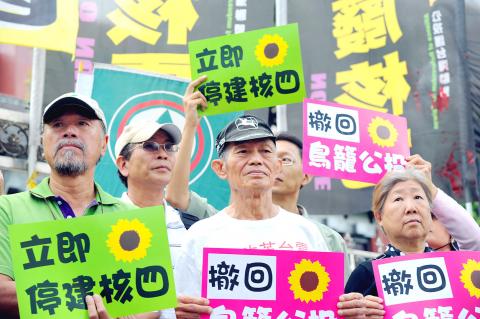During the first day of the new legislative session yesterday, anti-nuclear power environmentalists again gathered in front of the Legislative Yuan in Taipei, calling on legislators to stop the construction of the Fourth Nuclear Power Plant in Gongliao (貢寮), New Taipei City (新北市), and withdraw the referendum proposal on the plant.
Taiwan Environmental Protection Union founding chairman Shih Hsin-min (施信民) said the referendum proposal suggested by Chinese Nationalist Party (KMT) Legislator Lee Ching-hua (李慶華) is aimed at exploiting the “problematic” Referendum Act (公民投票法), ignoring public opinion and supporting the Cabinet’s will of allowing the plant to go into operation.
Although Lee last week publicly announced that he wished to withdraw the proposal, Shih said the proposal has already passed the first reading and is scheduled for a second reading in this session, so even if Lee claims to want to withdraw the proposal, he still has to go through procedures to make it effective.

Photo: CNA
“Lee should finish going through the procedures as soon as possible. The Legislative Yuan should acknowledge the public’s wish to bring a halt to the Fourth Nuclear Power Plant project,” he said, urging the KMT caucus not to block the proposal withdrawal.
The protesters said President Ma Ying-jeou’s (馬英九) approval rating had already dropped to 9.2 percent and if he does not stop the construction project, it may even plunge lower.
Pan Han-shen (潘翰聲) of the Green Party Taiwan said, ahead of next month’s National Day, that “we do not have anything to celebrate, because we have so many nuclear power plants in the nation and Taiwan is the only country that builds nuclear power plants right next to its capital.”
Pan said the public is invited to join in a “Fourth Nuclear Power Plant termination” relay walk around the nation, ending at the Presidential Office on Jan. 1.

A preclearance service to facilitate entry for people traveling to select airports in Japan would be available from Thursday next week to Feb. 25 at Taiwan Taoyuan International Airport, Taoyuan International Airport Corp (TIAC) said on Tuesday. The service was first made available to Taiwanese travelers throughout the winter vacation of 2024 and during the Lunar New Year holiday. In addition to flights to the Japanese cities of Hakodate, Asahikawa, Akita, Sendai, Niigata, Okayama, Takamatsu, Kumamoto and Kagoshima, the service would be available to travelers to Kobe and Oita. The service can be accessed by passengers of 15 flight routes operated by

MORE FALL: An investigation into one of Xi’s key cronies, part of a broader ‘anti-corruption’ drive, indicates that he might have a deep distrust in the military, an expert said China’s latest military purge underscores systemic risks in its shift from collective leadership to sole rule under Chinese President Xi Jinping (習近平), and could disrupt its chain of command and military capabilities, a national security official said yesterday. If decisionmaking within the Chinese Communist Party has become “irrational” under one-man rule, the Taiwan Strait and the regional situation must be approached with extreme caution, given unforeseen risks, they added. The anonymous official made the remarks as China’s Central Military Commission Vice Chairman Zhang Youxia (張又俠) and Joint Staff Department Chief of Staff Liu Zhenli (劉振立) were reportedly being investigated for suspected “serious

ENHANCING EFFICIENCY: The apron can accommodate 16 airplanes overnight at Taoyuan airport while work on the third runway continues, the transport minister said A new temporary overnight parking apron at Taiwan Taoyuan International Airport is to start operating on Friday next week to boost operational efficiency while the third runway is being constructed, the Ministry of Transportation and Communications said yesterday. The apron — one of the crucial projects in the construction of the third runway — can accommodate 16 aircraft overnight at the nation’s largest international airport, Minister of Transportation and Communications Chen Shih-kai (陳世凱) told reporters while inspecting the new facility yesterday morning. Aside from providing the airport operator with greater flexibility in aircraft parking during the third runway construction,

Taiwanese and US defense groups are collaborating to introduce deployable, semi-autonomous manufacturing systems for drones and components in a boost to the nation’s supply chain resilience. Taiwan’s G-Tech Optroelectronics Corp subsidiary GTOC and the US’ Aerkomm Inc on Friday announced an agreement with fellow US-based Firestorm Lab to adopt the latter’s xCell, a technology featuring 3D printers fitted in 6.1m container units. The systems enable aerial platforms and parts to be produced in high volumes from dispersed nodes capable of rapid redeployment, to minimize the risk of enemy strikes and to meet field requirements, they said. Firestorm chief technology officer Ian Muceus said